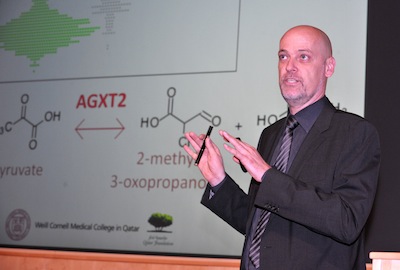Advances in metabolomics discussed at Grand Rounds
March, 2015

Dr. Suhre said that a comprehensive understanding of
metabolic processes may lead to the development of new
treatments.
The role of the metabolism in complex disorders such as diabetes, kidney disease and cardiovascular conditions was explored by a leading biomedical researcher in the latest installment of WCMC-Q’s Grand Rounds.
WCMC-Q’s professor of physiology and biophysics, Dr. Karsten Suhre, who is at the forefront of research into the relatively new field of metabolomics, explained the role of genetic variance in human metabolism, which influences the ways in which diseases develop and means that different patients will react to drugs and environmental factors in different ways.
Speaking before an audience of fellow researchers, physicians, students and healthcare professionals at WCMC-Q on February 8, Dr. Suhre said: “Metabolomics is an extremely exciting field because it can provide us with a holistic view of how the entire metabolism of a person functions on an individual basis. Just as genomics is the study of the whole human genome, metabolomics is the study of the whole human metabolism.”
The Grand Rounds, developed by WCMC-Q’s Division of Continuing Professional Development, provides a platform from which expert speakers can engage with healthcare professionals in the community to disseminate knowledge of the latest developments in medical technology, research and best practice.
Using state-of-the-art computer technology, Dr. Suhre and his team at WCMC-Q have been able to analyze blood and urine samples from patients to create so-called “metabolic maps” of the many thousands of chemical reactions that collectively form the human metabolome. Through analysis of genetic material, the team has been able to match genetic variance to metabolic processes that are thought to be responsible for a variety of diseases, including diabetes, kidney disease and cardiovascular disorders..
Dr. Suhre said: “Understanding the metabolic processes of diseases in depth is useful because it means physicians may be able to intervene in more sophisticated ways. For example, many health disorders are caused by a combination of genetic variance and environmental factors – metabolomics can help us to understand the interaction between the two and then direct the patient to avoid certain environmental factors by, for example, following a special diet, which will reduce their likelihood of developing the disease.”
Last year, Dr. Suhre’s team worked with partners in Europe to create a comprehensive metabolic atlas identifying the genes that influence how the body keeps our blood levels of sugars, fats and amino acids in balance. Based on a study of 7,824 participants, the research identified 145 genes that have a significant effect on the body’s metabolic capacities and was published in the prestigious journal Nature Genetics. The metabolic map is a valuable tool for scientists as it describes the pathways between genes, enzymes and metabolites, revealing how a drug used to target a certain gene may have several other effects on different pathways. This knowledge will help physicians and researchers not only identify which enzymes to target to treat diseases such as diabetes and cancer, but also to understand which other metabolites and enzymes will be affected by a particular drug. It will also help to select the correct combination of drug therapies to treat diseases in the most effective manner.
Dr. Thurayya Arayssi, WCMC-Q’s associate professor of medicine and associate dean for continuing professional development, said: “Dr. Suhre and his team here at WCMC-Q are conducting some truly groundbreaking research. Grand Rounds is a great vehicle through which we can share this new knowledge with the rest of the healthcare community in Qatar and the wider region, for the benefit of healthcare professionals, researchers, students and, ultimately, patients.”
